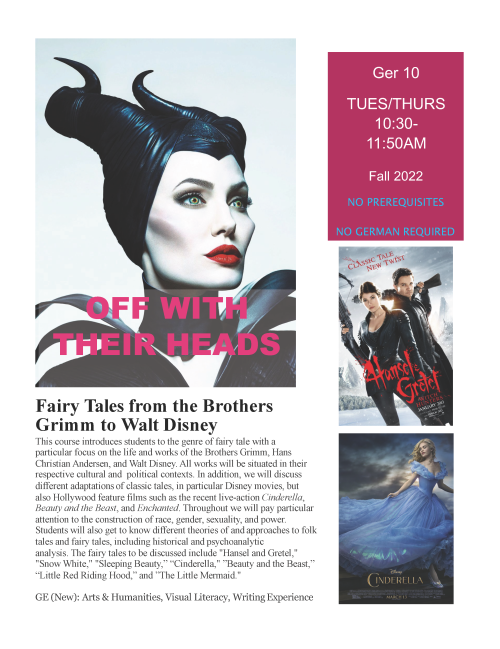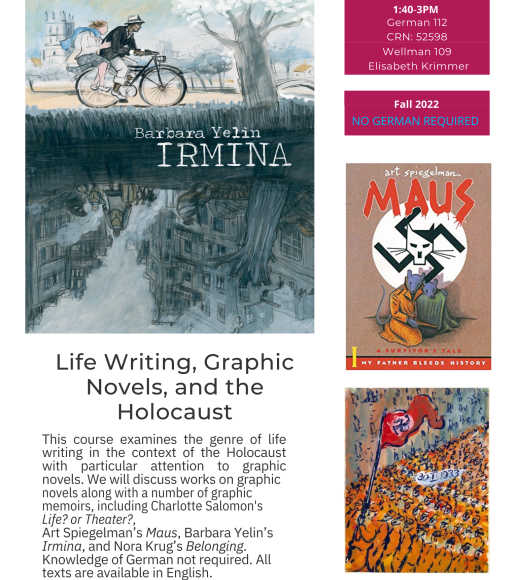Fall 2022 Courses
- For day, time, room, CRN, and TA information, see our PDF SCHEDULE or the class search tool: https://registrar-apps.ucdavis.edu/courses/search/index.cfm.
- For all courses not described below, please refer to the General Catalog course descriptions: https://catalog.ucdavis.edu/courses-subject-code/ger/
Jump to --> Language Courses | Lower-div | Upper-div | Graduate Courses
Undergraduate Courses
Language
GER 001, 002 Elementary German
GER 001: Elementary German grammar, vocabulary, conversation, and culture. Designed for absolute beginners. Not open to near-native or heritage speakers, or those who took German classes in high school.
GER 002: Continuation of elementary German. Prerequisite: GER 001 or consent of Language Program Coordinator. Not open to near-native speakers.
GER 020, 021 Intermediate German
GER 020: First course in intermediate German reading, writing, speaking, and listening. Review of 1st year grammar. Introduction of basic text & film analysis skills and higher-level communicative strategies. Prerequisite: GER 003 or consent of Language Program Coordinator.
GER 021: Continuation of intermediate German. Prerequisite: GER 020 or consent of Language Program Coordinator.
Lower Division
GER 010 Fairy Tales
Prof. Elisabeth Krimmer
This course introduces students to the genre of fairy tale with a particular focus on the life and works of the Brothers Grimm, Hans Christian Andersen, and Walt Disney. All works will be situated in their respective cultural and political contexts. In addition, we will discuss different adaptations of classic tales, in particular Disney movies, but also Hollywood feature films such as the recent live-action Cinderella, Beauty and the Beast, and Enchanted. Throughout we will pay particular attention to the construction of race, gender, sexuality, and power. Students will also get to know different theories of and approaches to folk tales and fairy tales, including historical and psychoanalytic analysis. The fairy tales to be discussed include "Hansel and Gretel," "Snow White," "Sleeping Beauty,” “Cinderella," ”Beauty and the Beast,” “Little Red Riding Hood,” and ”The Little Mermaid."
GE (New): Arts & Humanities, Visual Literacy, Writing Experience

Fairy Tales flyer Fall 2022_2.pdf
Upper Division
GER 101A German Literature 800-1800
Prof. Kirsten Harjes
This course will acquaint students with German-language literary works from 800 to 1800. We will take a cultural-historical approach, studying major historical events, technological innovations, music, and visual art alongside the literature. Germanic runes, sagas, and Old High German charms start us off. We continue with the Nibelungen Saga, tales of medieval knights and codes of chivalry, and the Black Death in the 14th century. The second half of the quarter takes us to Martin Luther and the Reformation, the 30-year war in the 17th century, and the folk story of Dr. Johann Faust. All primary texts, assignments, and discussions will be in German.
Prerequisites: GER 022 or the equivalent, or consent of instructor.
GER 112 Topics in German Literature - Life Writing, Graphic Novels, and the Holocaust
Prof. Elisabeth Krimmer
TR 1:40 - 3:00 PM
Wellman 109
This course examines the genre of life writing in the context of the Holocaust with particular attention to graphic novels. We will discuss works on graphic novels along with a number of graphic memoirs, including Charlotte Salomon's Life? or Theater?, Art Spiegelman’s Maus, Barbara Yelin’s Irmina, and Nora Krug’s Belonging. Knowledge of German not required. All texts are available in English.

GER 133 German Drama
Prof. Sven-Erik Rose
TR 10:30 - 11:50 AM
OLSON 141
In this course we will discover the German-language theater tradition by reading a selection of plays written from the 18th through the 20th century by Bertolt Brecht, Marieluise Fleißer, Gerhart Hauptmann, Gotthold Ephraim Lessing, Arthur Schnitzler, Frank Wedekind, and Peter Weiss. These plays exemplify various important artistic movements, including Enlightenment drama, Naturalism, Expressionism, and Modernism, and explore fundamental questions about gendered and class experience, social structure and social violence, sexuality, generational conflict, and the possibilities of politically engaged art, among other issues. As we read these plays, we will practice literary analysis and develop our skills in reading, writing, and speaking German. Readings, papers, and class discussions will be in German.
Graduate Courses
GER 255 Aesthetics: Goethe
Prof. Sven-Erik Rose
GER 390A The Teaching of German
Kirsten Harjes
